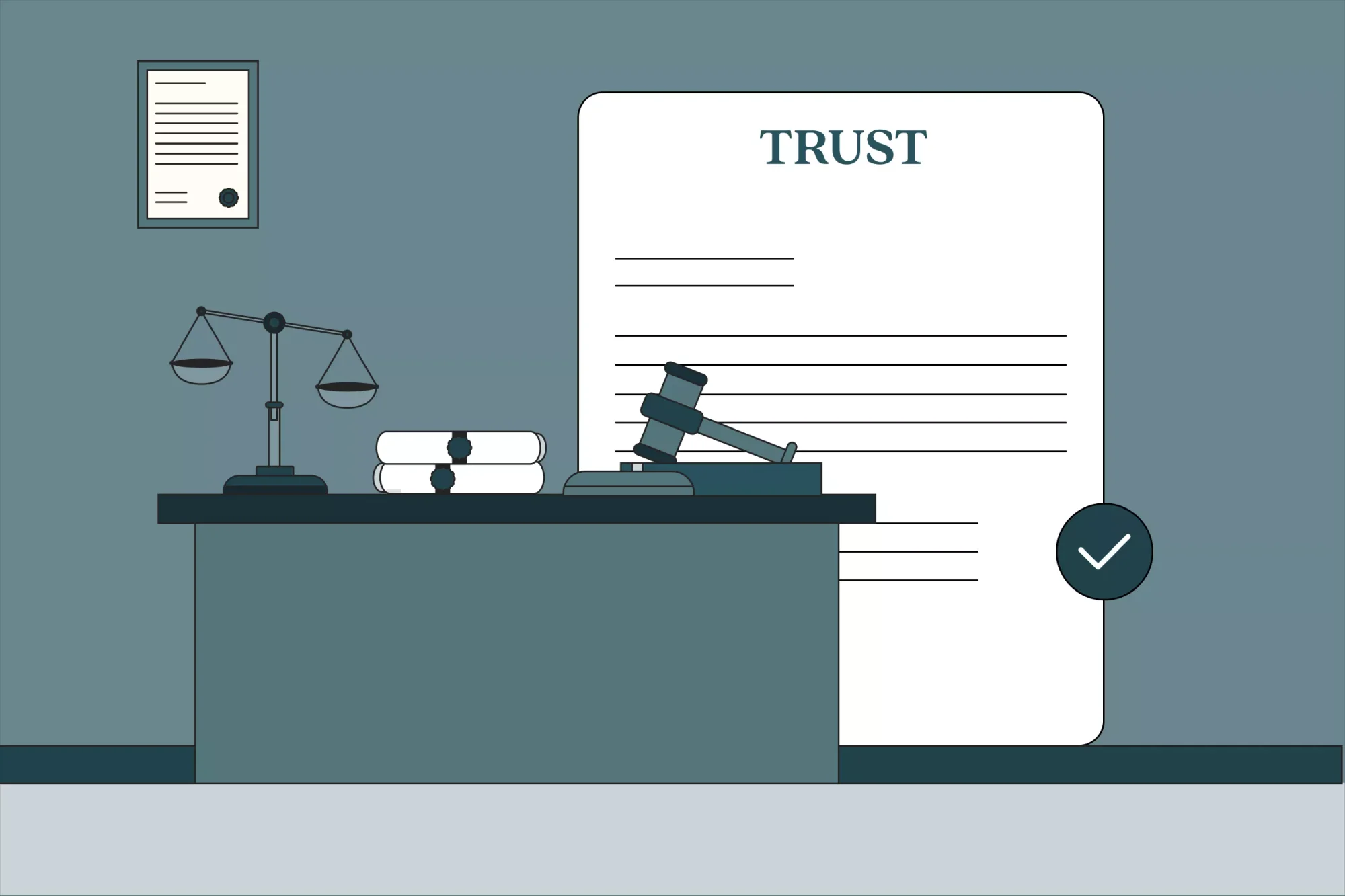Establishing a trust is a crucial aspect of estate planning and asset management for many individuals. Trusts offer numerous benefits, including control over asset distribution, privacy, and potential tax advantages. But what is a trust? How do I set up a trust? And what’s the difference among a trust, a trust fund, and a trust account?
If you’ve ever asked these questions, you’re not alone. Trusts can seem confusing at first, but they’re actually one of the most flexible and practical ways to manage your personal or family wealth.
Whether you're planning your estate, protecting assets, or just getting started with long-term financial planning, this guide will help you make informed decisions with clarity and confidence.

How do I set up a trust?
Setting up a trust requires you to choose your trust type, select which assets to include, name your trustee and beneficiaries, draft the legal documents, and fund the trust by transferring asset ownership. The process typically takes a few weeks and can be done online or with an attorney.
1. Choose the type of trust
Different types of trusts serve different purposes. A revocable trust offers flexibility, letting you amend or cancel the trust during your lifetime while avoiding probate.
An irrevocable trust provides stronger protections, including possible estate tax reductions and insulation from creditors or lawsuits. However, you give up direct control of those assets.
If you're wondering, "What type of trust should I set up?" the answer depends on your financial goals, privacy preferences, and need for control. There are many types of trusts, so do your research or seek legal advice if you are unsure of your needs.
2. Select assets for the trust
Once you've chosen the right structure, the next step is to decide which assets to include in the trust. This will form the core of your trust fund.
A trust fund can hold a wide range of assets.
- Cash and savings: Bank accounts, CDs, and emergency funds
- Investments: Stocks, bonds, and mutual funds
- Real property: Homes, rental properties, and land
- Business assets: Ownership interests and operating companies
- Personal valuables: Jewelry, family heirlooms, and artwork
When selecting assets, consider how they align with your goals. For example, if you want to generate long-term income for your family, investment assets may be ideal.
If your goal is to shield high-value property, placing real estate or business interests into an irrevocable trust may help protect beneficiaries from creditors or legal claims. The trust legally owns these assets, offering an extra layer of protection.
You don't need to include everything at once. Some people start small and add to their trust over time, when it's ideal for them to do so. Others prefer a fully funded trust from the beginning. Either way, keep in mind the type of trust funds you're creating and who they're intended to benefit.
3. Appoint trustees and beneficiaries
It's critical to appoint the right people or institutions to help run your trust.
The trustee is the person or organization responsible for managing the trust. You can serve as your own trustee for a revocable trust, or appoint someone else, though a trust company or bank trust department is often used for larger or more complex trusts. When choosing a trustee, consider their financial knowledge and reliability.
Beneficiaries are the people or organizations who will ultimately receive assets from the trust. You can name multiple beneficiaries and specify exactly what each person receives and when. This flexibility is one of the main advantages of setting up a trust.
4. Prepare trust documents
The trust document is the legal foundation of your trust. It outlines who the trustee is, who the beneficiaries are, what assets are included, and how those assets should be managed and distributed.
You can draft trust documents yourself using online services, or work with an attorney to ensure everything is legally sound and tailored to your specific needs. Many people find that working with a professional gives them peace of mind, especially for more complex situations.
Some states require notarization or witness signatures, so be sure to check your local requirements.
5. Fund and manage the trust
Once your trust document is signed, you need to fund the trust by transferring ownership of your chosen assets into it. This might include retitling bank accounts, updating property deeds, or reassigning investment accounts to the trust's name.
After the trust is funded, ongoing management is key. The trustee will need to maintain accurate records, file any required tax returns, and follow the terms of the trust document. Regular reviews ensure the trust continues to meet your goals as circumstances change.
Understanding trusts—the basics
1. What is a trust, and how do trusts work?
A trust is a legal arrangement where you (the grantor) transfer assets to a trustee who manages them for your chosen beneficiaries. The trust ensures your assets are used or distributed exactly according to your instructions.
At its core, a trust is both a legal document and a financial structure. It outlines how the assets should be handled and who benefits from them. This document is often referred to as the trust document, and it’s the foundation of the trust’s legal framework.
When you place assets into the trust, like real estate, money, or investments, they become part of the trust estate. This refers to everything the trust owns. These assets are also called trust property, which simply means the individual items (like a house, a bank account, or stocks) that now belong to the trust.
To manage these assets, the trustee may use a trust account—typically a bank account or an investment account opened in the name of the trust. This account helps keep track of deposits, payments, and distributions made on behalf of the trust.
In short, a trust structure includes:
- Trust property. The actual assets (house, cash, stocks)
- Trust estate. The full collection of trust property
- Trust account. An account in the trust’s name where the trustee keeps and manages the trust’s money
- The grantor. The person who creates the trust and puts assets into it
- The trustee. The person or institution that manages the trust
- The beneficiaries. The people or organizations that receive funds, property, or other provisions from the trust
- The trust document. The legal agreement that outlines how the trust works
Under trust law, having this trust set up can help you avoid probate, protect privacy, and make sure your financial wishes are carried out exactly as you intended. So, if you're wondering what a trust is and why you need one, the answer is simple: it's a powerful way to protect family and assets, on your terms.

2. Trust vs. will: a quick comparison
Wondering what the difference is between a trust and a will? Let’s get a glimpse of it here:
- A will goes through probate, which can be public, costly, and time-consuming.
- A trust typically avoids probate, keeps matters private, and lets you set conditions on asset distribution.
Each tool serves a different purpose, and many people choose to have both. But if privacy, speed, and control matter to you, a trust may offer more of what you're looking for.
3. What is a trust fund?
A trust fund is a collection of assets, such as money, property, or investments, held within a trust. While the trust sets the rules for how and when those assets are used, the trust fund is what actually gets managed and distributed by the trustee.
A trust fund account is a financial account established in the name of the trust to hold and track the assets. Simply put, if the trust is the rulebook, and the trust fund is the treasure chest it protects.

What are the types of trusts?
There are many types of trusts, and the right one depends on your goals, assets, and who you want to protect. There are four main trust categories: revocable, irrevocable, living, and testamentary.
Let's break them down.
1. Revocable trust
A revocable trust describes a trust you create during your lifetime. It gives you, as the grantor or settlor, the ability to change the beneficiaries and assets while you're alive and physically and mentally able to. It also gives you the right to dissolve the trust at any time. There are no tax benefits or creditor protections associated with these trusts.
A revocable living trust is typically used for:
- Planning for incapacitation. This is one of the main reasons people choose a revocable trust. As long as you're capable, you can manage your own assets as the trustee. But you also name a successor trustee, who steps in automatically if you become incapacitated, without needing court approval.
- Avoiding probate. Assets in a revocable trust usually pass directly to your beneficiaries, avoiding the time and potential cost of probate court.
- Maintaining privacy. Unlike a will, the contents of a revocable trust generally remain private after death.
- Full control. The ability to retain full control while you're alive and still have a backup plan for when you're not is a key reason to consider a revocable trust.
2. Irrevocable trust
Unlike a revocable trust that can be changed, an irrevocable trust is permanent. This type of trust can't be changed once it has been funded.
An irrevocable trust is usually used for these specific purposes:
- Minimizing estate taxes. Because the assets are owned by the trust rather than the grantor, this arrangement may reduce or, in some cases, eliminate certain estate taxes for beneficiaries.
- Asset protection and retention. This is one of the few trust types that may shield assets from creditors or lawsuits. It can also hold lifetime gifts or manage wealth long-term for heirs.
Important distinction. Unlike a revocable trust, an irrevocable trust can provide stronger protection for assets, but you lose direct control.
Also note: Assets in an irrevocable trust usually avoid probate, but you must structure the trust properly.
3. Living trust
Living trusts, also called loving trusts and inter-vivos trusts, can be revocable or irrevocable. The trust document details your assets in the trust that will be used for your benefit during your lifetime and how they'll be distributed after your death.
Why it’s called “living”: Because it’s created and operates while you’re still alive, and typically manages your assets both during life and after death.
For example, a living trust might state how your bills will be paid if you become incapacitated. This type of trust is not the same as a healthcare power of attorney. That separate legal document gives a third party the power to make medical decisions on your behalf.
4. Testamentary trust
A testamentary trust, also called a will trust or trust under will, specifies how your assets are designated after you or your surviving spouse dies. Because the trust terms are established in your will, you can change these terms before your death by updating your will. However, it is important to follow local and state laws carefully to ensure that any changes to the will—and therefore to the trust—are legally valid.
It’s used when someone wants to leave assets to minor children, dependents, or beneficiaries who may need help managing money. The trust outlines how and when those assets should be used, such as for education, healthcare, or living expenses, often over a set period of time.
Characteristics:
- Since it’s part of your will, it must go through probate to get established.
- You can revise the terms of this trust by updating your will.
- It is often used to manage inheritances for minors or individuals who need help managing money over time.

What are other types of trusts?
Here are some other important trust fund types or types of trust accounts, whether it's supporting your family, handling property, giving to charity, or managing business succession.
- Family trust: A family trust is used to hold and manage assets for the benefit of multiple family members, often spanning generations. This structure can simplify inheritance and provide long-term financial support.
- Business trust: A business trust holds business assets or ownership interests and is often used for succession planning or to limit liability.
- The difference between a business trust and a personal trust is that personal trusts are set up for individuals or families, while business trusts are focused on commercial assets.
- Personal (or private) trust: A general term referring to any trust set up for individual use (as opposed to a charitable or business purpose). It can be revocable or irrevocable, depending on your goals.
- Charitable trust: A charitable trust is created to support charitable causes while offering potential tax benefits to the grantor. Common types include charitable remainder trusts (CRTs) and charitable lead trusts (CLTs).
- Property trust: Also referred to as a real estate trust, property trusts specifically hold real estate or property assets. These are used to manage, protect, and pass on property without the need for probate. This is sometimes referred to as a real estate trust fund.
- Inheritance trust: Helps manage how and when beneficiaries receive inherited assets. It may include protection against creditors, divorce, or irresponsible spending. Often used as part of long-term estate planning.
- Simple trust: A simple trust must distribute all its income to beneficiaries annually and cannot make charitable contributions or retain income. It's more of a tax classification than a structural type.
A trust helps your family avoid the extra cost, time, and stress of probate. We’ll guide you through the setup.

Funded vs. unfunded trusts
Creating trust is just the first step. For it to work the way you intend, you also need to fund the trust, which means transferring ownership of your assets into it.
1. What is a funded trust?
A funded trust is one that owns actual assets such as money, real estate, or investments. These assets are formally transferred and retitled in the name of the trust during your lifetime, so the trust becomes the legal owner.
For example, you might transfer your home, bank accounts, or stocks directly into the trust so the trustee can manage or distribute them later.
2. What is an unfunded trust?
An unfunded trust has only the legal documents in place, but no assets have been moved into it. This can happen by accident or by design; some people plan to fund the trust through a pour-over will after their death. In that case, the trust is funded only once probate is complete and the will directs assets into the trust.
A frequent mistake is failing to properly fund the trust; that is, not transferring ownership of the assets into it. If an asset isn’t titled in the name of the trust, it won’t be protected or distributed according to your plan. Also, forgetting to update beneficiary designations or leaving out key assets is a common issue.
3. Why does funding matter?
An unfunded trust leaves your assets unprotected. Until assets are actually moved into the trust, it won’t avoid probate or provide for beneficiaries. That’s why it’s strongly recommended to fund your trust during your lifetime, especially if you're using a revocable or living trust to manage your estate.

What are the benefits of a trust?
There are many reasons why someone might choose to create a trust, and the benefits go beyond just avoiding probate.
- Flexibility in distributions: Decide how and when assets are distributed, making it easier to plan for unique situations like supporting minor children or loved ones with special needs.
- Privacy of financial matters: Unlike a will, a trust keeps your affairs private by avoiding public court proceedings.
- Potential tax advantages: Certain trusts (especially irrevocable ones) may reduce estate taxes or shield assets from creditors—particularly helpful for high-net-worth individuals or business owners.
- Probate avoidance: Assets transfer directly to beneficiaries without court delays or public records.
- Incapacity planning: A successor trustee can manage your affairs automatically if you become unable to do so.
However, the advantages of trusts must be weighed against the costs and complexity of both setting up and maintaining it. A professional consultation and analysis of trust fund alternatives can guide you in deciding if a trust is the best fit for your estate planning objectives.

What assets shouldn't be in a trust?
Having a trust is a great way for people to protect their assets and ensure that their assets will be handed off to their beneficiaries smoothly. However, some things shouldn't be included in your trust:
- Retirement accounts: Don't transfer 401(k)s, IRAs, or 403(b)s into a trust, because doing so triggers a taxable withdrawal.
- Health savings accounts: HSAs and medical savings accounts can't be transferred due to their tax-advantaged status.
- Active checking accounts: Keep daily expense accounts outside the trust unless you're the trustee with full control.

What are the disadvantages of a trust?
While the benefits of a trust are clear, you should be aware of some of the disadvantages of having a trust. Trusts often require substantial initial and ongoing costs and can be difficult to maintain.
Here are four of the most common challenges:
- Setup fees. The initial trust setup using an estate planning attorney can range from $1,000 to more than $5,000, depending upon the complexity of the trust and the attorney's fees. There are also recurring administrative costs, such as trustee, tax preparation, and legal fees.
- Ongoing recordkeeping. A trust can be complex and difficult to understand and manage. It requires meticulous recordkeeping. There is a strict legal framework that you or your trustee must adhere to, which can be intimidating.
- Asset risk. Not all trusts offer creditor protection. For instance, the assets in a revocable trust are not protected because you retain control over your assets.
- Potential tax burden. Some trusts, such as simple trusts and irrevocable trusts, may be subject to a higher income tax rate than an individual taxpayer in certain situations.
Who should set up a trust? Common examples
Trusts are no longer just for the ultra-wealthy. You might be surprised how often a trust is a smart choice.
Here are a few situations where setting up a trust makes sense.
1. Families with young children
A parent may create a family trust structure to provide for their children. The trust includes real estate and investments, and the trust document instructs the trustee to release funds every year to cover education and healthcare until the children reach age 30.
2. Blended families or second marriages
An individual in a second marriage may create a living trust to protect specific assets, such as a home or retirement account, for their children from a previous relationship. The trust document names specific beneficiaries and outlines how those assets will be distributed after death. It also allows the surviving spouse to remain in the home while ensuring that ownership passes to the children after a death certificate is presented. This structure helps preserve wealth for future generations while minimizing potential disputes.
3. Special needs planning for your loved ones
A special needs trust (SNT) can provide long-term care without affecting government benefits. A parent of a child with a disability may set up a special needs trust to ensure their child receives financial support for medical care and daily living, without risking eligibility for government programs like Medicaid or SSI. The trust names a specific trustee to manage the funds and outlines distributions over the child’s lifetime.
4. Real estate owners
If you own property in more than one state, a trust can avoid multiple probate proceedings. For example, if a couple owns a home in Florida and a cabin in North Carolina, by placing both properties into a revocable living trust, they allow those assets to pass directly to their children, bypassing the need for probate in two states after a death certificate is issued.

5. Business owners
A small business owner may use a business trust to pass company shares to their children. This ensures a smooth transfer of ownership without going through probate. The trust business option helps protect the company’s continuity and may help avoid family conflict.
6. Charitable giving
A charitable trust can support causes you care about while offering potential tax benefits. For example, an individual may set up a charitable trust to support a nonprofit cause they care about. Every year, the trust donates a fixed percentage of its income to selected organizations. This trust fund option reduces estate taxes and creates a long-term giving strategy.
7. Privacy protection
If you’d prefer to keep your estate matters confidential, a trust is a better option than a will.
Someone who values privacy may set up a living trust to avoid probate, which is a public process. The trust document includes detailed instructions for distributing specific assets to named beneficiaries, ensuring that personal and financial information stays private after death.

8. Moderate to high net worth individuals
You don’t need to be ultra-wealthy to benefit from a trust. Many estate planners recommend creating one if your total assets, such as real estate, savings, and investments, are valued at $100,000 or more.
So, at what net worth should you consider a trust? There’s no fixed rule, but if you own property, have minor children, or want to minimize probate and taxes, a trust can help simplify things for your loved ones while giving you more control over your estate.
Each of these trust options and examples of trusts shows how flexible and powerful trusts can be, whether you're planning for your family, your business, or the greater good.
Ultimately, the purpose of setting up a trust is to have more control over what happens to your assets, both during your lifetime and after your death. Additionally, consider the type of assets you want to protect and their potential tax implications. You can ensure your trust aligns with your specific needs and financial circumstances by consulting with an estate planning attorney or a financial professional.
How much money do you need to have a trust?
While having a trust fund is generally associated with the very wealthy, the reality is that there is no set amount of money required for you to set up a trust. Anyone can set up a trust regardless of income level if they have significant assets worth protecting.
You can start a trust fund for as little as a $100 initial deposit and a few hundred dollars in fees, but if you have $100,000 or more and own real estate, then a trust might be beneficial to protect your assets.
What are the costs and considerations for creating a trust?
The costs of creating a trust vary depending on its complexity and the necessary upkeep. Legal fees for establishing a trust typically exceed $1,000, with additional fees for transferring property, transferring ownership, and continuous maintenance. Before deciding, it's necessary to balance these costs against the trust's benefits and juxtapose them with alternative options.
When assessing the costs and benefits of establishing a trust, consider the potential tax advantages, the level of control and asset protection it will offer, and the needs of your beneficiaries. Consulting with an estate planning attorney or a financial professional can help you make the best decision for your unique circumstances.
What taxes should you consider for a trust?
As with most things related to estate planning, trust tax laws can be complicated. If you want to take advantage of the tax benefits related to your trust, it would be helpful to consult with an estate tax attorney or professional while creating your trust.
Here are the taxes to keep in mind:
- Estate taxes. When you die, a large estate may be subject to federal estate tax. For tax year 2025, the federal estate tax ranges from 18% to 40% and generally applies to assets over $13.99 million. This will increase to $15 million for deaths occurring in 2026. Some states have their own estate taxes, so you could pay two estate tax bills. Irrevocable trusts can lower such taxes by removing assets from your estate.
- Inheritance taxes. This is a tax paid by your beneficiaries or heirs on the assets they receive from your estate. It applies in certain states and is based on the value of the inheritance they receive, not the total size of your estate. Rates can vary depending on the inheritor's relationship to you, such as a spouse versus a child. There is no federal inheritance tax, but some states have inheritance taxes. Only Maryland has both estate and inheritance taxes on top of the federal estate tax.
- Capital gains and income taxes. Some trust assets can generate income, triggering income taxes or capital gains taxes. Exactly who pays the tax depends on who legally owns the assets. Charitable donations may be exempt.

How do trusts make money, and how do trust funds pay out?
Let’s now look at how trusts can generate wealth and how to access the funds.
How do trusts make money?
A trust isn’t just a place to store assets; it can also help those assets grow.
Once funded, the assets in a trust can generate income. Trustees often invest trust funds in stocks, bonds, mutual funds, or even rental property, depending on the trust’s goals and risk tolerance. This is called a trust fund investment strategy, and it’s a key way that a trust makes money over time.
Yes, trusts can earn interest, and they often do. For example, a trust account held in a high-yield savings account or fixed-income investments can gain regular interest. While returns vary, it’s common for trust accounts to gain interest similarly to any standard investment account. The amount of interest a trust fund earns depends on how the funds are invested, the market, and the type of trust.
Can money in a trust be invested? Absolutely. Investing is often essential to ensure the trust keeps growing and remains useful for long-term needs.
How do trust funds pay out?
Trust funds may pay out depending on what’s written in the trust document. Some trusts make monthly payments to beneficiaries, while others distribute lump sums at certain milestones like turning 25, graduating from college, or buying a home.
The trustee follows specific distribution rules set by the grantor. These rules determine how much money is released, how often, and under what conditions. For example:
- A trust fund for a child may provide a monthly allowance until adulthood.
- A family trust bank account might release money to several beneficiaries at different times.
- A business trust may allocate income generated by a company to owners or heirs.
Most trusts are designed to be flexible, but the trustee must always act in the best interest of the beneficiaries and according to the terms laid out in the trust document.

Seeking professional assistance
Considering the complexity of establishing a trust fund, it's advisable to enlist professional help from estate planning attorneys, financial advisers, or online services. This can help ensure the trust is set up correctly and optimizes potential tax benefits. A trust attorney can help guarantee that the assets in the trust account are managed in the most tax-beneficial way for your beneficiaries.

Why use LegalZoom to set up your trust
Setting up a trust can feel complex, but LegalZoom makes the process easier, more approachable, and fully guided, so you don’t have to do it alone.
With LegalZoom, you get a complete set of essential estate planning documents tailored to your specific needs and valid in all 50 states. Whether you’re creating a living trust, appointing a financial power of attorney, or outlining healthcare wishes, everything is handled through a step-by-step online process you can complete from the comfort of home.
If you choose LegalZoom, you also get the option to have your documents reviewed by an estate planning attorney licensed in your state, plus unlimited 30-minute consultations to answer questions or help you make updates as life changes. You’ll also get secure online storage and the ability to make revisions, helping you keep your trust current and aligned with your intentions.
See what our happy customers are saying:
This process was easier than I thought ... The lawyer I worked with was very personable and knowledgeable.
- Colette W., estate plan customer
FAQs
How do I transfer ownership of my house to my trust?
To transfer ownership of your house to a family member, first spouse, or other beneficiary in your trust, you would:
- Draft a new deed by copying the old one and updating the necessary information
- Fill out a quitclaim on your house
- Fill out a real estate deed transfer form
- Copy your certificate of trust
- File all these documents with the appropriate local office responsible for property records, such as the county clerk, recorder of deeds, or land records office, depending on your state or jurisdiction
How does the trust management and administration function?
Trust management and administration involve carrying out the grantor's directives, managing assets, and distributing funds to beneficiaries. Trustees are responsible for overseeing the trust assets, ensuring the trust is conducted appropriately, monitoring expenses, accounting for and reporting on trust assets, and preparing tax and regulatory filings.
Trustees receive compensation for their work, while the costs tied to trust management and administration can fluctuate depending on the trust's complexity and the beneficiaries' requirements. Ongoing trust management is crucial to ensure the trust serves its intended purpose and provides financial security for your beneficiaries.
Can I make some legal arrangements to ensure my child graduates from college before certain other assets are distributed?
Yes. When setting up a trust, you can ensure a beneficiary meets a certain age requirement before receiving assets. In this case, you could designate that all educational expenses would be paid at the university level. You can then designate that your child receive all or a portion of the assets you have set aside for the educational expenses of that individual.
How much money do you need to have trust?
You can start a trust fund for as little as $100 in initial deposit and a few hundred dollars in fees, but if you have $100,000 or more and own real estate, then a trust might be beneficial to protect your assets.
What are the types of trust?
There are four primary classes of trusts: revocable trusts, irrevocable trusts, living trusts, and testamentary trusts. A revocable trust can be altered or terminated during the trustor's lifetime, while an irrevocable trust cannot. Finally, a testamentary trust is created within the context of a will.
What is the difference between a revocable trust and an irrevocable trust?
A revocable trust allows the grantor to make changes or terminate the trust. In contrast, an irrevocable trust is permanent and offers greater asset protection and potential tax benefits.
What are the ongoing taxes on trusts?
If your trust has property that gains value, loses value, or otherwise creates income, you must pay the Internal Revenue Service taxes on that trust income on Form 1041. When filing your state income tax returns, you'll want to check your state tax code to see if you need to file locally.
Can I set up an irrevocable trust for myself?
Yes, you can set up an irrevocable trust for yourself. However, once it’s created, you generally give up control over the assets and can't make changes without court approval or beneficiary consent. People often use irrevocable trusts to protect assets or reduce estate taxes.
Can I withdraw money from a trust account?
Only the trustee has the authority to withdraw money from a trust account, and even then, it must be done according to the trust's terms. If you’re a beneficiary, you can’t withdraw money yourself unless the trust document allows for direct access.
How do I access a trust fund?
If you're a trust fund beneficiary, your access depends on the rules set by the grantor. Some trusts allow regular distributions, while others are tied to age milestones or specific events. Speak to the trustee to understand your rights.
What happens when a trust is formed?
When a trust is formed, legal ownership of the selected assets transfers to the trust. The trustee becomes responsible for managing those assets, and beneficiaries gain rights to distributions based on the terms outlined in the trust document.
How do I put assets in a trust?
Funding a trust involves retitling property and updating account ownership.
For example, to move a home into a trust, you’ll need to execute a new deed naming the trust as the property owner. For bank accounts, you’ll need to update the account title with your bank to reflect the trust’s name.
This process varies slightly depending on the asset type and state laws, so it’s helpful to consult an estate attorney or financial institution.
Can I be both the trustee and the beneficiary of a trust?
Yes, you can be both the trustee and a beneficiary, especially in a revocable trust. However, if it’s an irrevocable trust, dual roles may raise legal or tax complications, so it’s best to seek professional advice.
From naming beneficiaries to setting conditions, see what you can customize in your trust.

Can a trust be a beneficiary of another trust?
Yes, a trust can be named as the beneficiary of another trust. This is often done for estate tax planning or to keep assets within a layered trust structure.
What is a layered trust structure?
A layered trust structure is often used when someone wants to protect different types of assets, manage risk, and plan for complex family or financial situations.
For example:
- One trust may hold real estate to avoid probate and manage property transfers.
- Another may be an irrevocable trust to protect high-value assets from creditors or reduce estate taxes.
- A third could be a special needs trust for a child with disabilities to ensure long-term care without affecting government benefits.
This structure allows the grantor to apply different legal, tax, and distribution rules to each trust—tailored to specific beneficiaries or asset types—while keeping the overall estate plan more organized and secure.
How can I put money in a trust?
To put money in a trust, you can open a new trust account at a bank or transfer funds from an existing account. Most financial institutions will require a copy of your trust document to verify the trustee’s authority. Once the account is open, you can deposit cash and checks or even set up direct deposits from other sources.
Can a trust own stock?
Yes, a trust can hold and manage stock just like an individual can. Publicly traded or privately held shares can be titled in the name of the trust, and the trustee manages these investments.
How do I include digital assets in a trust?
To include digital assets, such as online accounts, crypto wallets, or digital files, in a trust, you must list them in the trust document and ensure the access/login credentials, like a username and password, are available. Be specific in naming the assets and give your trustee authority to manage them legally.
Should I put everything in my name in a trust?
It’s common to ask whether you should put everything in a trust. While many assets can be transferred, not everything needs to be. Instead of moving every account or item, consider whether each one benefits from being in the trust. For example, everyday checking accounts typically don’t need to be included unless they hold significant value or you want tighter control over them.
How do you set up a trust fund for a child?
To set up a trust fund for a child, follow these simple steps.
- Choose the type of trust: Most parents use a revocable living trust or a family trust that becomes active during their lifetime and can be changed as needed.
- Decide what to include: Add assets like savings, investments, property, or life insurance payouts.
- Name a trustee: Pick someone you trust to manage the assets until the child reaches a certain age.
- Set the terms: In the trust document, explain when and how the child should receive the money, like for education, healthcare, or after turning 25.
- Sign and fund the trust: Legally sign the documents and move the assets into the trust.
How do you terminate or dissolve a trust?
Trust termination depends on the type of trust and its terms. For revocable trusts, the grantor can usually terminate it at any time. For irrevocable trusts, dissolution may require court approval or a beneficiary agreement. Proper documentation and final asset distributions are required before closure.
Can a trustee be removed or replaced?
Yes, you can remove or replace a trustee, especially if the trust document allows it or if the trustee becomes incapacitated, unfit, or unwilling to serve. Some trusts name a successor trustee in advance, and others allow beneficiaries or courts to step in if necessary.
How do international trusts work?
International trusts are used when the grantor, trustee, or beneficiaries live in different countries or when assets are held abroad. These trusts can involve complex tax rules and legal considerations, so it's critical to work with attorneys experienced in cross-border estate planning.
How and when are trustees compensated?
Trustee compensation depends on the trust terms and state laws. Some trustees (especially professionals or institutions) are paid a percentage of the trust’s assets annually. A trustee’s payment for managing a trust depends on what the trust agreement allows and the regulations of the state where it’s administered. Payment could be set as a flat amount, calculated as a percentage of the trust’s value, or determined by another method specified in the governing documents. Compensation must be fair and reasonable.
Can a trust help with Medicaid planning?
Yes, some trusts, especially irrevocable Medicaid trusts, can help protect assets from being counted toward Medicaid eligibility. However, they must be set up carefully and well in advance due to look-back periods. The look-back period is typically five years, during which the government reviews your financial records to check whether you’ve given away or transferred assets in order to qualify for Medicaid. If such transfers are found, you could face a penalty period that delays your Medicaid benefits. This is a common strategy in long-term care and elder law planning, but it requires careful timing and legal guidance.
Diane Faulkner contributed to this article.

